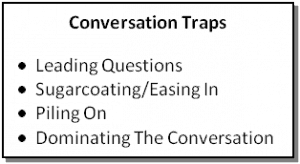Difficult Conversations – How What You Were Taught Derails You From Your Message
A few years ago, Harvard Professor, Chris Argyris did some interesting research. He met with hundreds of executives preparing for conversations that involved delivering tough messages. He asked what they planned to say and how they would say it. Then he observed and recorded the meetings. In every case, the executives did not say what they planned to, the messages were unclear, and yet, the executives thought they had been effective – until he replayed the recordings. This groundbreaking research resulted in a list of derailers that every human, regardless of culture, demographics or experience falls into when communicating under stress. Despite many attempts to disprove it, this study has been validated over 20,000 times.
In my consulting practice, I have found that leaders at all levels struggle with difficult conversations. One reason is that the message they intend to deliver gets derailed as the focus of the conversation strays from the real issue – largely because of how they handle the conversation. If you don’t think this applies to you, have you ever encountered someone who, ‘just didn’t get it,’ despite repeated attempts to explain?
Much of what derails focus from the real issue is that we use ‘tricks’ we were taught. We ask leading questions, hoping people find their way to our point of view. We pile on issue after issue to prove our point and hammer people into agreement. We sugarcoat the message so we don’t hurt someone’s feelings. Sometimes, we are so focused on being right that we forget to ask what they think. We ‘sandwich’ negative messages between two positive ones because we were taught was the ‘right way’. And then we expect the other person to ferret out the real issue.
Argyris tells us there are three values we cling to under stress that cause us to do these things. The first is that we seek to maximize control and minimize negative emotion. The second is trying to win and not lose, which turns conversations into competitions. And the third is fighting to maintain control at all costs. In a conversation, these values show up as derailers – traps we fall into.
In a workshop, I often face disagreement about how these strategies are ‘not all that bad.’ People tend to cling to approaches they have mastered whether they work or not. I did too…until I realized saw my results when I stopped using them. To understand why these traps remove the focus from the real issue, turn the tables and think of how you feel when someone:
- Asks you a leading question? (Don’t you think you
 should have…?)
should have…?) - Tells you how great you are as a lead in to a conversation you know is going somewhere else?
- Piles on issue after issue?
- Controls the conversation so you don’t have time to explain why you did what you did?
I’m guessing your focus goes somewhere else. In the case of leading questions, many people say their focus goes to guessing where they’re being lead or to just agreeing to end the conversation. When I am over-complimented, but know there’s more, I wait for the next shoe to drop. When people are piled on, they typically focus on the easiest issue, not necessarily the most important. And when someone controls the conversation and I don’t get a chance to tell the full story, I shut down. What about you?
When you become aware of your traps, difficult conversations become a whole lot easier. While what to do instead could (and does) fill an entire workshop, awareness if the first step. To keep the focus of your conversations firmly on the issue at hand, think about which of these traps you typically fall into and challenge yourself not to use them. If you’re not sure what traps you, go ask your team – they know. If you replace your traps with a focus on the real issue, your conversations will be exponentially more effective. Of course, this assumes that you are clear on what the real issue is. And that is the subject of another post.
This article was also published in ‘Woman 2 Woman’, newsletter of the Women’s Network in Electronic Transactions (WNet), Q1 2012.
